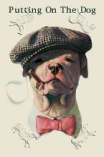|
|
 |
|
~~~~~~~~~~~~~~~~~~~~~~~~~~~~~~~~~~~~~~~~~~~~~~~~~~~~~~
|
 |
The Book Mavens Talk to Marge Piercy
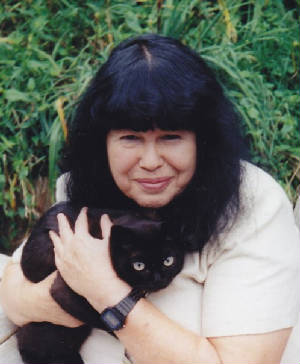
|
| Marge Piercy with Sugar Ray |
One of my favorite
features in The Smoking Poet has always been our author interviews. TSP editors have taken turns doing these, each
of us according to our literary tastes and interests, but this time—I decided on a different approach. I’ve long
been a fan of Marge Piercy’s work. Piercy is a strong, feminist voice in contemporary literature. Her range is one of the most expansive of any
author you’ll find on the bookshelf; she has written 17 novels and 17 poetry books. Within that astounding quantity
is great range of genre: literary, contemporary, science fiction, nonfiction.
How to grasp
such a talent of such great range? Then it came to me: this would not be an interview for one editor talking to one author.
This was a job for the Book Mavens. The Book Mavens is a group of women with insatiable appetites for a good read, based in
Kalamazoo, Michigan. We (I am one of these ravenous mavens) meet monthly at the home of Marsha Meyers, much loved librarian
at Portage District Public Library. Or, sometimes we meet at some favorite eatery or pub or a back room of the library. Usually, there is wine and a selection
of homemade organic foods involved … all to keep our appetites in check.
The Book Mavens
set about to read the work of Marge Piercy. Rather than discussing one book, we discussed many, many. Between us, we read
15 titles, and several of us have continued to read more of Piercy’s work, even once the assignment was concluded. Such
are our appetites. And so we met, twice, to discuss the body of work that Piercy has produced, each of us offering insights
and questions and our own perspectives. The interview below is a compilation of our questions—with Marge Piercy’s
replies.
~
Zinta Aistars, Maven and Editor-in-Chief, TSP
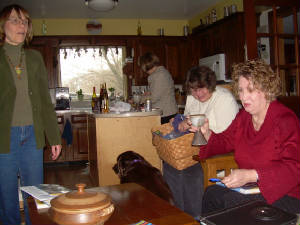
|
| Mavens gather to discuss Piercy's books |
MAVENS: We are all in wonderment
at how an author can be so prolific and also write with such great range in genre and style! Our first questions seem quite
naturally to be about your work process. We are curious to know more about how your writing day is organized, your approach
to that blank page, the many choices you must make as you begin and sustain your work. Are you a very disciplined and organized
writer? Is your work planned and outlined or on the wing of a muse?
MARGE PIERCY: I am quite disciplined.
I work every day I am home except Mondays, when I deal with bills, laundry, interviews, letters, sending out poems, etc.
I have an assistant two days a week who helps with the mail, filing, errands, etc. I seldom work on the road, although
I may make notes. But seldom do I do real writing while doing gigs.
You
can't improvise a novel without generating a lot of garbage and wasting lots of time, which I don't have. Poetry is
more improvisational a lot of the time, but not always. Sometimes I set out to write a particular type of poem or on
the particular subject.
I am ‘prolific’ because I do not have an academic
job. I didn’t go that route in order to have a lot more time to write. I
don’t have financial security but I have the freedom to write and the time to do it.
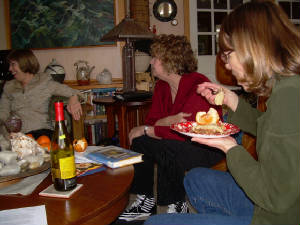
|
| Judy, Martha, Marsha (l-r) |
MAVENS: Do you write prose and poetry concurrently or do you get into
a poetic groove for a while, then switch to prose another day?
MARGE PIERCY: I am almost always
writing poetry, except when I am revising prose to a deadline, when I work every day until I can't use my eyes longer.
I seldom write poetry and fiction or nonfiction on the same day. Poetry is much
more intense and I can only do it for two or three hours. Prose I can write for
much longer. I can write first draft for up to four hours and second draft
up to six and so on, longer for each draft.
MAVENS: How do you decide if
your seed of an idea belongs in prose or poetry? Or do these ideas sometimes show up in both forms, simply with a different
approach?
MARGE PIERCY: There is no way you could confuse an idea for
novel with an idea or a rhythm or an image that begins the process of writing a poem.
It’s like saying, how can you tell whether your pet is a dog or a cat.
They have entirely different geneses and intentions and cannot possibly be confused.
Similarly, a nonfiction book may have poetry in it, as my PESACH FOR THE REST OF US does, and as my memoir SLEEPING
WITH CATS DOES, but that doesn’t conflate the two genres.
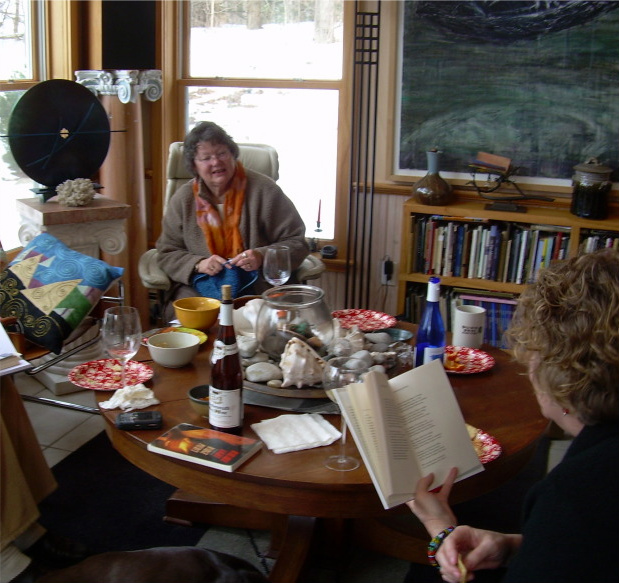
|
| Anne and Martha |
MAVENS: What is writing to you? Is it a way for you to see the world
around you? A tool of interpretation and translation? A means of coping with life? Or does the writing process work as a lens,
a way to absorb an experience and make it your own? It occurred to some of us in reading your poetry that it may even be a
kind of journaling for you, as you often write poetry about every day events and images and emotions, the kind we all know
in our routines yet may not always know how to voice …
MARGE PIERCY: I don’t
do journaling. I’m a working professional writer. I don’t have time
and I am not that fascinating to myself. Most journals are of no interest except to the person who is writing down their daily
stuff.
As for what you can write
poetry about, you can write a poem about anything at all you pay enough attention to: an earthworm, a carrot, a domestic violence
episode in the paper, a woman killed in Iraq, a great fuck, a stupid quarrel, getting a cold, cleaning the house. It is a matter of paying attention in the moment so that you truly experience what moves you in the thing. It may come from your life or somebody else’s or the newspaper or
something fleetingly observed or overheard, but it has something in it that wants to be intensely examined, experienced, made
into an artifact.
Fiction to me is the working
out through time of what happens when people in a particular time and place, a particular socioeconomic situation, located
in history make certain choices. Then what happens next? Then what? And how does it all come out?
I get to exorcise my autobiographical
impulses in memoir and some in poetry, so that in fiction it is other people’s lives I am examining, with the exception
of BRAIDED LIVES, my only partly autobiographical bildungsroman. With the historical
novels, I want to explore how we got to where we are now. In the science fiction novels, I am exploring possible alternative
futures coming from choices we make now.
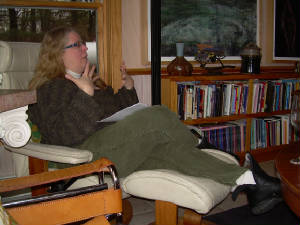
|
| Kathy |
MAVENS: Some of us felt in reading your work that writing is
your tool of discovery. Do you approach your work with emotion and perspective and message in mind, or does your writing evoke
emotion and bring its message to you as you work?
MARGE PIERCY: Depends on what I’m working on. I do a lot of research
for my novels, so that is educational to me. I have a clear theme in mind with
fiction before I begin. With poetry, it all depends on the poem.
MAVENS: How has your writing process changed over the years? Looking back over the great expanse of work you have
produced, are you pleased? Do you have a favorite child among them? Do any of your books, now standing at a distance of time,
surprise you? Perhaps reader response might have surprised you (what messages readers get from your books may or may not be
what you intended)?
MARGE PIERCY: My novels often
have multiple viewpoints, so readers identify with different characters and the novel will be different for them according
to where they situate themselves emotionally. That’s fine. Once an artifact-- poem or fiction or memoir-- is finished and published, it belongs to the readers, not
to me.
Sometimes a reading is so
far off that I cannot agree with it. A woman some years ago wanted to write an
opera based on my novel VIDA. Her take on the politics was so much farther right
than I could stomach that I withdrew my approval for her using my work in her libretto.
I think my writing process
has changed simply because if you work in a discipline for a long time, you master more aspects of craft as you work, so you
can do more and do it more efficiently. The world changes too and work that was
unacceptable twenty years ago is publishable now. Also you learn more as you
age, if you want to, and you find new ideas and experiences.
I remember at one time I
was interviewed and the interviewer commented that I had written about death a fair amount when I was younger but at that
time [I was in my forties] I didn’t seem to do so any longer. I said some
bullshit about how I had matured and accepted death as a process of living. Blah
blah. Then my mother died, which affected me strongly. Then my father died. Then my brother died. Then my friends started dying and by now I have to face my own mortality.
Guess what? I write a lot of poems about death and have for some years.
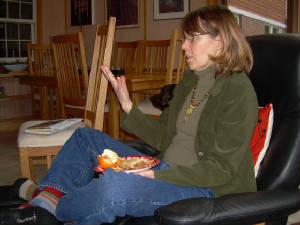
|
| Marsha |
MAVENS: Some of yours works (e.g., City of Darkness, City
of Light; Sex Wars) tackle history, important historical events and movements. We are curious about your research in preparation
for writing these. Tell us how you approach historical fiction, from birth of idea to research for accuracy of background
and the transposing that experience to the page.
MARGE PIERCY: When I have decided to work in the particular era, I do a lot of research about it. I read and read until I have a good sense of the time and what interests or doesn’t interest me. For instance, I was thinking of writing about the American revolution, but after I
read for three months, I couldn’t find a man I really liked and the women aside from Abigail Adams seemed not central
enough for me to write about.
Once I have found my era
and my themes that interest me there, I work on character. I spend at least two
months or longer on my major characters, coming to understand them. Sometimes
like Robespierre I have known him in my own time in another context and thus have a leg up.
For instance GONE TO SOLDIERS
is a long novel, but the database of research was seven times longer. For CITY
OF DARKNESS, CITY OF LIGHT, the same. And SEX WARS, the same. Same with both
WOMAN ON THE EDGE OF TIME and HE, SHE AND IT, the science fiction novels. After
first draft, I have an idea what more specific research needs to be done to flesh out parts of the novel. Same after 2nd draft, etc. So the research into
details is on-going. Maybe I need to see a locale. Maybe I need to know what people ate in fancy restaurants of the time. Maybe I need to know what undergarments
a middle class woman would wear. Maybe I need to know whether a workingclass
woman would be in a factory or doing piece work at home.
MAVENS: All your
books, no matter prose or poetry, convey feminism as an ideal, sometimes a call to action or at very least, awareness. Tell
us your general idea of feminism, what it means, how you see that movement in its beginnings and where the women’s movement
is today. While some would argue “we’ve come a long way, baby,” others see the objectification of girls
and women today is, arguably, worse than ever. Perhaps even that women and girls today are selling out. As one of our strongest
contemporary and literary voices of feminism, please share with us your observations, hopes, disappointments, and perhaps
even your call of action to girls/boys/women/men today…
MARGE PIERCY: Feminism for me is the basic idea that justice demands that everyone gets a fair shake
and is not forced into roles, not punished, not limited in choice by their gender [or their race or their sexual orientation
or their religion or their ethnicity]. That humanity is not definite by the male. That
women’s bodies are their own property and women are granted the autonomy to choose to have or not have sex when and
with whom they choose and to give birth or not when and how they choose.
We have accomplished certain
goals and failed to accomplish others. There are powerful forces both religious and corporate arrayed against our right and
constantly trying to destroy them, sometimes outright, sometimes by whittling them away. We also need to fight the cultural
biases ingrained in many people from birth that demean and injure women. We need to remake the health system to administer
to women’s and children’s needs. We need more women in public office. We need to fight the idea that the ideal
woman is an ageless plastic thing that has the body of a fourteen-year-old boy.
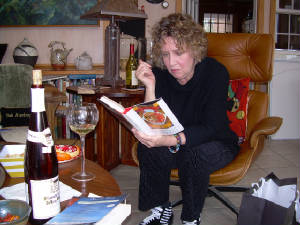
|
| Martha |
MAVENS: In many of your books, including your autobiography,
Sleeping with Cats, you address the concept of open marriage. You describe your own experiences in open marriage, although
your marriage to writer Ira Wood is what most would call “traditional.” Again, with the perspective of distance
and experience, how do you feel about open marriage today? Also, in many of your books (e.g. Storm Tide, co-written
with Ira Wood, where the pros and cons of open relationships are explored extensively), and, it seems, in your own experience
as well, open marriage works only when there is an alpha couple, with reassurance to that alpha partner that he or she remains
in a higher status than other partners. When push comes to shove, the alpha partner maintains a right to end other relationships,
and when this no longer holds true, the primary relationship comes apart. Is this perhaps a need of human nature, which we
must all feel that we come first to someone, even if we are willing to share other aspects of our relationship? Or is that
something you think we should try to overcome?
MARGE PIERCY: Open relationships – now called polyamory – work only if everybody in a network of relationships
is equally committed to the openness. If even one person would prefer monogamy,
it doesn’t work. Things don’t have to revolve around an alpha male
or female. We aren’t wolves. We don’t live in an orderly pack. Things work best if there is close to equality.
If two couples form a unit, then each of them probably has stronger ties to their original partner, but that can work
very well.
MAVENS: Even as many of your books explore what it means to
be a strong woman at the beginning and middle of life, do you see books you will write in later years as dealing more with
what it means to be an older woman today? (We are hopeful.) Ageism is a very real bias in contemporary society, especially
in the American culture and especially as it pertains to women. Your thoughts on this
MARGE PIERCY: Malkah
in HE, SHE AND IT is elderly. So are some of the other women I have written about
over the years. I have written much about aging and ageism in my poetry. If the novel I have very recently begun is ever published, one of the protagonists
is a woman of 80.
MAVENS: The husband of one of our group members couldn’t
resist picking up one of your poetry books to read while we were all delving deep your work. He wondered: if we could have
tea with Marge Piercy, would you speak the same in person as you do in your work? Would we recognize your voice after reading
your books?
MARGE PIERCY: Poems are artifacts, not pieces of the person. Of course my personal voice would be different – and far less distinguished. My poems are worked over and over. My
person is not.
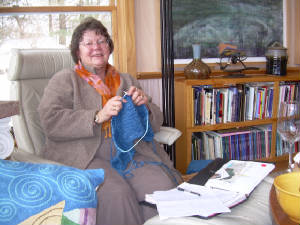
|
| Anne always brings her knitting |
MAVENS: Home, it seems clear in your work, is Cape Cod. What
does the concept of home mean to you? As a native of Detroit, any nostalgia for Detroit or Michigan? (And please know, should
you ever pass this way, that there is an open place for you among a group of women in Kalamazoo with great curiosity about
all things literary!)
MARGE PIERCY:
One of the things that most struck me about the Cape was that in some ways it reminded me of western Michigan. I have sunk roots here, but as you can tell from my poetry, I write a lot about Detroit. And of course both BRAIDED LIVES and GONE TO SOLDIERS are set partially in Detroit. So is THE HIGH COST OF LIVING – set entirely in Michigan and mostly in Detroit.
MAVENS: Cats show up in your work regularly, sometimes as background, sometimes as
characters in their own right. Indeed, your autobiography has cats beautifully described and in vivid detail throughout. In
a life that has seen many changes, cats seem the constant. Please talk to us about cats and this special relationship you
have with them. And who are your cats today…
MARGE PIERCY: We have five cats presently.
Malkah, who is in the memoir, is 14 and very beautiful, an apricot and white cameo tabby with medium long hair. She
is a rescue, very intelligent and rather lazy. She purrs if you speak to her
and whenever you pet her or give her some food she likes. She appreciates. She can purr me to sleep at night and often does.
She reads our body language with tremendous accuracy and also has a larger vocabulary she understands than any other of our
cats. We could not say VET after she was two or so. We said V E T. Then she learned
that. Then we switched to Nancy, the name of our vet. Now we have to say Dr.
Weintraub, but I don’t know how long it will take her to understand that.
Efi is 11, a Siamese who
was very sick when we got her. Malkah and I nursed her back to health. She is
skittish, not the brightest bulb in the chandelier, but gorgeous and affectionate on her own terms. She and Malkah share a
lesbian relationship. They are almost always together. They wash each other,
eat together, go out on the sunporch together, andsleep together.
Sugar Ray is a lover, not
a fighter, as he often says. He is a Burmese, sable, particularly my cat although
affectionate with Ira. He sleeps against my side every night. He sits on my lap whenever possible. When I got out of town, he retreats and mopes. He would like to put me on a leash. He is far more interested
in love than in food. He is nine. He is a pacifist and if he sees a mouse, looks
at it with interest but does nothing else. He has never even caught a fly.
Puck is a “blue”
Abyssinian. He does not consider himself a cat, but rather the son and heir. He is James Beard reincarnated, our only cat who not only eats but demands human food
at least a little every day or he gets furious. He knows his propers. He is a working cat, a very good mouser. He is the favorite
of every guest, because he is quite social with people, although he regards the other cats as beneath him. He is eight. We got him right after 9/11 when we were very depressed.
Someone we know was on the first plane. I had almost died that summer
of babesiosis and our favorite cat Max was killed and eaten by coyotes, so that the cats could not go outside any longer as
our cats had for decades. We got Puck to cheer ourselves up.
Mingus is the youngest,
a year and a half old. Sugar Ray’s mother as the great grandmother of Mingus. Don’t ask me how, but they recognized each other at once. Within five minutes
of meeting, they bonded. They sleep together, play, Mingus washes Sugar constantly,
not that Sugar needs it, for he is a real dandy. Puck wanted to kill Mingus for
the longest time, but finally although he gets jealous sometimes, he has accepted Mingus as his acolyte and is teaching him
to hunt, so far without a lot of success. Mingus is too eager and scares off
the mice. [we live in the woods and have two kinds of mice coming inside all
winter]. Mingus constantly studies and imitates Sugar Ray and Puck. He is particularly Woody’s cat and adores him, but he sleeps beside me because he sleeps inside a
semi-circle of Sugar Ray every night. But before he goes to sleep, he says goodnight
to Woody and then in the morning climbs on him and demands to be petted. He gets
into a lot of mischief.
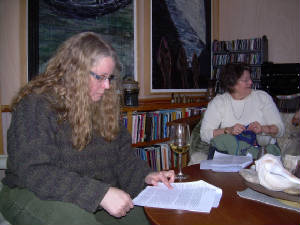
|
| Kathy and Anne |
MAVENS: Your mother and father seem to have had great influence
on you and appear in your books in various guises. Talk to us about how they helped—or hindered—your views/development
on a woman’s role, on feminism, on your writing.
MARGE PIERCY: My mother taught me to be observant. My
grandmother Hannah was very important to me. She gave me my religious education,
gave me unconditional love. My mother, my aunt Ruth who was halfway in age between
my mother and me and grandmother Hannah taught me viewpoint, because they all told the same story different ways. My Aunt
Ruth was the first woman I knew who wore pants, who worked not as a school teacher or a secretary [she worked for the Navy]
and who was a jock. I have written a lot about my mother, my grandmother and
my Ruth.
My father never really had
much to do with me. He never did read anything I had written.
MAVENS: Other influences in your life—your Jewish roots, a Lithuanian
grandmother—appear in your work, too. Talk to us about these influences, how great or less great they may bear on you,
or give you wing, or point in different directions …
MARGE PIERCY: I don’t
think of her as Lithuanian as they were very anti-semitic and probably still are. She
spoke and read Yiddish, Lithuanian, Russian and Polish and lastly and with most difficulty, English, but considered herself
ignorant because she did not know Hebrew. Women prayed in Yiddish, which is what
she spoke to me. As I said, she gave me my religious education. When soon after World War II ended, when she learned that everyone, everyone in the stetl she had grown
up in had been murdered by the Germans and their Lithuanian allies, I will never forget her grief. I promised her then I would always be a Jew. She gave me a strong sense of the female side of Judaism,
the myths, the women’s lore.
My much older brother Grant,
for whom I wrote the whole brotherless sequence of poems, was a big influence on my childhood.
Since I did not see him for twenty-five years after I was twelve, his influence was earlier than that.
MAVENS: We thank you for your work and for your time in answering our many questions! All the book club members
agreed that this has been an enriching experience and has led to lively discussion among us, some of the best we’ve
had. For that, we are grateful. You have given us pause for thought and new insight, and given all women a stronger voice
in literature.
MARGE PIERCY: Thank you and
your group for your time and interest.
|
 |
|
To learn more
about Marge Piercy and read excerpts of her work, visit her Web site.
Read poetry by Marge Piercy.
Read book reviews of Marge Piercy books.
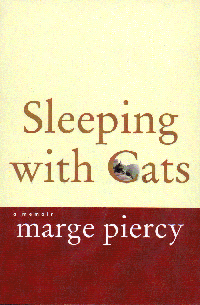
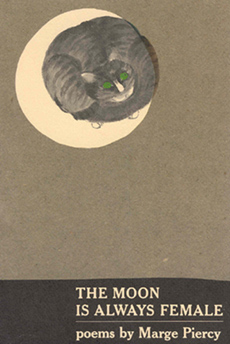
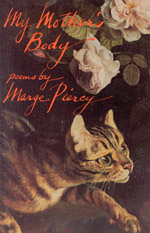
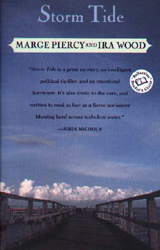
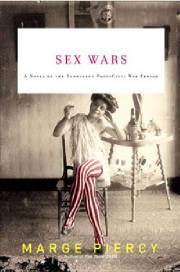
|
 |
|
|
 |
|
|
|
|
Feedback, submissions, ideas? Email thesmokingpoet@gmail.com
|
|
|
 |
